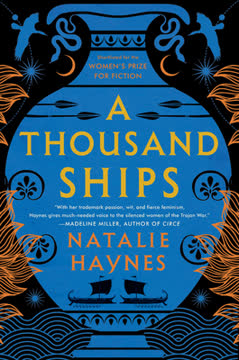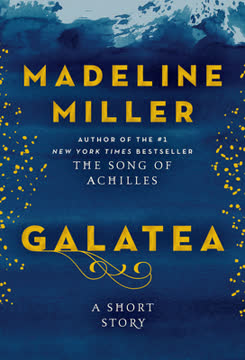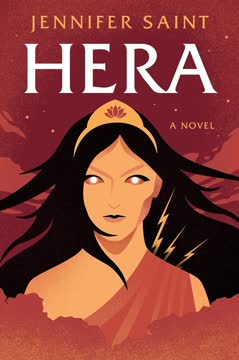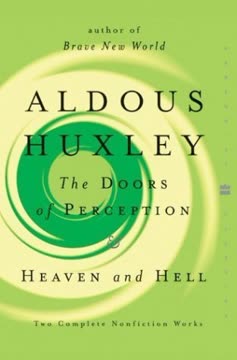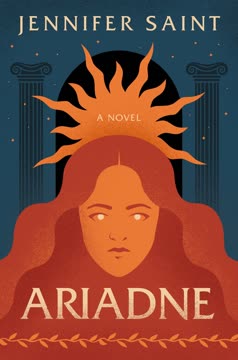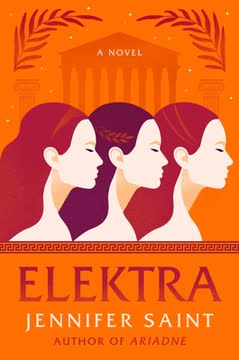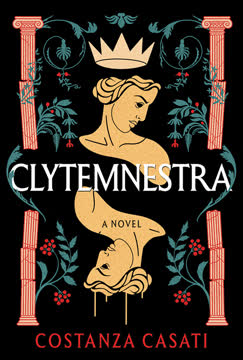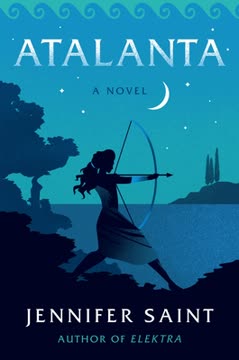Plot Summary
Muse Refuses the Poet
Calliope, the muse of epic poetry, is summoned by a poet to sing of war and heroes. But she resists, weary of the endless male-centric tales and the demand for her inspiration. Instead, she insists that the true story of the Trojan War is not that of the men, but of the women—those who suffered, survived, and endured. This sets the tone for a retelling that centers the overlooked voices, challenging the traditional epic's focus and promising a narrative that will finally give the women their due.
Troy's Final Night
As Troy burns, Creusa, wife of Aeneas, awakens to chaos. The city, thought victorious after the Greeks' apparent departure, is betrayed by the infamous wooden horse. Creusa's desperate search for her family and escape through smoke-filled streets is interwoven with memories of hope and the city's pride. The fall is not just a military defeat but a personal unraveling—her home, her identity, and her future are consumed by fire. The gods, once invoked for protection, are now silent, and Creusa's fate is sealed in the darkness before dawn.
Women Amidst Ruins
On the shore, the Trojan women—Hecabe, Andromache, Polyxena, Cassandra, and others—await their fate as spoils of war. Their queen, Hecabe, mourns her slain husband and sons, clinging to the hope that one child, Polydorus, survives in hiding. The women's grief is raw, but their suffering is compounded by the knowledge that, for them, the end of war means not death but the loss of everything else: freedom, family, and dignity. Their conversations reveal the futility of blame and the universality of their pain.
Warnings Unheeded
Theano, a priestess, and others recall how warnings to return Helen and avoid war were dismissed by prideful men. The gods' messages, delivered through dreams and omens, are ignored or misinterpreted. The wooden horse, a clear danger to some, is welcomed by others, manipulated by Greek trickery and divine interference. The women's wisdom and foresight are powerless against the momentum of male ambition and hubris, sealing Troy's doom.
The Wooden Horse Deception
Sinon, a Greek left behind, spins a tale of sacrifice and betrayal, convincing the Trojans to bring the horse inside their walls. Laocoon's warning is silenced by the death of his sons, interpreted as a sign from the gods. The horse, filled with Greek warriors, is the instrument of Troy's destruction. The city's trust, manipulated by both men and gods, leads to its annihilation. The women, powerless to intervene, witness the consequences of decisions made without them.
The Amazon's Last Stand
Penthesilea, the Amazon queen, arrives to aid Troy, seeking death in battle to atone for accidentally killing her sister. Her prowess is unmatched, but she is slain by Achilles, who is momentarily shamed by the realization that he has killed a woman as valiant as any man. Her death marks the end of hope for Troy and underscores the tragedy of women's heroism erased by war.
The Cost of Victory
The Greek victors divide the surviving women and treasures. Briseis and Chryseis, once princesses, become prizes for Achilles and Agamemnon, their agency stripped away. The plague sent by Apollo, in response to Agamemnon's refusal to return Chryseis, devastates the Greek camp, showing that even victors are not immune to suffering. The women's fates are determined by the whims of men and gods, their grief and resilience largely unseen.
Penelope's Waiting Game
Penelope, wife of Odysseus, writes letters to her absent husband, chronicling her years of waiting, the pressure from suitors, and her strategies to delay remarriage. Her intelligence and emotional complexity are revealed as she navigates loneliness, hope, and the demands of Ithaca's men. Her story, often overshadowed by Odysseus's adventures, becomes a testament to the quiet heroism of those left behind.
The Plague and the Prize
The plague in the Greek camp forces Agamemnon to return Chryseis, but he claims Briseis from Achilles, sparking a rift that nearly destroys the Greek cause. The women's bodies are currency in the politics of war, their suffering a backdrop to male pride and conflict. The gods' interventions, often petty and self-serving, further complicate mortal lives, blurring the lines between justice and vengeance.
Sacrifice at Aulis
Before the war, Agamemnon sacrifices his daughter Iphigenia to appease Artemis and secure passage to Troy. The girl's innocence and the deception of her mother, Clytemnestra, highlight the brutality of patriarchal power. Iphigenia's death haunts her mother, sowing the seeds of future vengeance and underscoring the expendability of women in the machinery of war.
The Goddesses' Contest
At the wedding of Thetis and Peleus, Eris, goddess of strife, throws a golden apple inscribed "for the fairest." Hera, Athene, and Aphrodite vie for the prize, and Paris of Troy is chosen to judge. Each goddess offers him a bribe, but he chooses Aphrodite, who promises him Helen. This divine contest, rooted in vanity and spite, sets in motion the events that lead to the Trojan War, showing how women's fates are shaped by the caprices of gods.
The Fall of Kings
With Troy fallen, the narrative follows the fates of the royal women. Hecabe, enslaved, exacts revenge on Polymestor for murdering her son Polydorus. Andromache, Hector's widow, is taken by Neoptolemus, her son Astyanax killed to prevent future vengeance. Cassandra, cursed to prophesy but never be believed, is claimed by Agamemnon and murdered alongside him by Clytemnestra. The cycle of violence and retribution continues, with women both victims and agents of fate.
The Price of Betrayal
The betrayal of Troy by allies and the Greeks' own betrayals among themselves highlight the precariousness of trust and the high cost of survival. Hecabe's revenge on Polymestor is both justice and a perpetuation of violence. The women's actions, often born of desperation, challenge the notion of passive victimhood and reveal the complexity of agency under oppression.
The Fate of the Innocent
The Greeks, fearing future retribution, kill Hector's son Astyanax by throwing him from the city walls. Andromache's grief is immeasurable, and the act underscores the relentless logic of war: to secure victory, even the innocent must die. The women's mourning is both personal and collective, a lament for lost children, lost futures, and the impossibility of true peace.
Vengeance and Aftermath
Agamemnon's return to Mycenae is met not with celebration but with murder. Clytemnestra, driven by the sacrifice of Iphigenia and her husband's arrogance, kills him and Cassandra. The Furies, embodiments of vengeance, are invoked, and the cycle of bloodshed continues. The aftermath of war is not healing but further unraveling, as old wounds breed new ones.
The Weaving of Stories
Calliope, the muse, reflects on the stories told and untold. She insists that the epic is not just the tale of men's glory but of women's endurance, suffering, and strength. The narrative closes with a call to remember and honor the women whose lives and losses are woven into the fabric of history, challenging the silence that has long obscured them.
Characters
Calliope
Calliope, the muse of epic poetry, frames the entire narrative, refusing to be a passive source of inspiration for yet another male-centered epic. She is witty, sharp, and self-aware, determined to shift the focus to the women whose stories have been neglected. Her meta-commentary challenges both the poet and the reader to reconsider whose voices are heard and whose suffering is remembered. She is the embodiment of the book's central thesis: that the epic belongs to all, not just the victors or the men.
Hecabe (Hecuba)
Hecabe, once queen of Troy, is the emotional core of the Trojan women's experience. She endures the loss of her husband, sons, and city, and faces enslavement with a mixture of dignity, rage, and despair. Her relationships with her daughters, daughters-in-law, and fellow captives are marked by both tenderness and bitterness. Hecabe's arc—from queen to slave to avenger—reveals the psychological toll of war and the resilience required to survive its aftermath.
Andromache
Andromache, wife of Hector, is defined by her love for her family and her suffering. The murder of her son Astyanax and her enslavement by Neoptolemus strip her of everything, yet she endures. Her psychological journey is one of profound grief, guilt, and adaptation. She is both a victim and, in her later life, a builder of new communities, showing the possibility of life after devastation, though always shadowed by loss.
Penelope
Penelope's story is told through letters to Odysseus, revealing her wit, intelligence, and emotional complexity. She navigates the pressures of suitors, the uncertainty of her husband's fate, and the demands of motherhood with resourcefulness and grace. Her psychological depth challenges the stereotype of the passive, faithful wife, showing instead a woman who actively shapes her own destiny within the constraints imposed upon her.
Cassandra
Cassandra, daughter of Priam, is gifted with prophecy but cursed never to be believed. Her visions of doom and her inability to alter fate make her a tragic figure, isolated even among her own people. Her psychological torment is acute—she sees the future's horrors but is powerless to prevent them. Her eventual murder by Clytemnestra, after being taken as Agamemnon's prize, is the culmination of her lifelong suffering and the ultimate silencing of her voice.
Clytemnestra
Clytemnestra, wife of Agamemnon, is driven by the murder of her daughter Iphigenia. Her psychological landscape is one of simmering rage, calculation, and a relentless pursuit of justice as she sees it. Her relationship with Aegisthus and her children is fraught, and her eventual murder of Agamemnon and Cassandra is both personal vengeance and a challenge to patriarchal power. She is both monstrous and sympathetic, a product of her traumas.
Briseis
Briseis, taken by Achilles after her city falls, is a study in survival and suppressed grief. Her beauty makes her a prize, but her inner life is marked by loss and adaptation. Her relationships with other captive women, especially Chryseis, reveal solidarity and the small acts of resistance possible within captivity. Her story exposes the commodification of women in war and the psychological cost of being reduced to property.
Polyxena
Polyxena, youngest daughter of Hecabe, is chosen as a sacrifice to appease the ghost of Achilles. Her acceptance of death over enslavement is both an act of agency and a testament to the limited choices available to women. Her fate is a microcosm of the war's destruction of innocence and the impossibility of escape from cycles of violence.
Theano
Theano, priestess and wife of Antenor, represents the wisdom and warnings of women that go unheeded. Her attempts to avert disaster by urging the return of Helen are dismissed, and her family's survival is secured only through betrayal. She embodies the frustration and impotence of those who see disaster coming but lack the power to prevent it.
Eris
Eris, the goddess who sets the Trojan War in motion by introducing the golden apple, is a symbol of the unpredictable and often petty forces that shape human destiny. Her actions, though divine, have mortal consequences, and her presence in the narrative underscores the theme that women—goddesses and mortals alike—are both agents and victims in the stories men tell.
Plot Devices
Polyphonic Narrative Structure
The novel employs a polyphonic structure, shifting between the perspectives of various women—Trojan, Greek, mortal, and divine. This device decentralizes the traditional epic hero and instead creates a tapestry of experiences, emotions, and responses to war. The narrative is non-linear, moving back and forth in time, and often revisiting the same events from different viewpoints, deepening the reader's understanding of trauma and resilience.
Meta-Narrative and the Muse
Calliope's direct address to the poet and the reader serves as a meta-narrative device, questioning the very nature of epic storytelling. By foregrounding the act of narration and the choices of what stories are told, the novel invites readers to reflect on whose voices are privileged and why. This device also allows for commentary on the limitations and responsibilities of storytelling itself.
Foreshadowing and Prophecy
Prophecy, especially through Cassandra, is a recurring device that creates dramatic irony and a sense of inevitability. The repeated failure of men to heed women's warnings is both a plot engine and a thematic statement about the marginalization of female wisdom. The use of foreshadowing heightens the tension and underscores the tragic outcomes.
Reinterpretation of Myth
The novel reimagines well-known myths from the women's perspectives, often subverting or complicating the traditional narratives. By filling in gaps, inventing inner lives, and connecting disparate stories, the book creates a cohesive and emotionally resonant alternative epic. This device also allows for commentary on the process of myth-making and the erasure of women's experiences.
Epistolary Elements
Penelope's chapters are structured as letters to Odysseus, providing a direct, personal window into her thoughts and feelings. This device contrasts with the more public, collective voices of the other women and highlights the private costs of public events.
Analysis
is a radical reimagining of the Trojan War, shifting the focus from the celebrated deeds of men to the overlooked suffering, endurance, and agency of women. By giving voice to queens, slaves, goddesses, and ordinary women, Natalie Haynes exposes the epic's blind spots and challenges the reader to reconsider the meaning of heroism, victory, and loss. The novel interrogates the structures—mythic, social, and narrative—that have silenced women, and insists on the necessity of telling their stories. It explores the psychological aftermath of war, the cycles of violence and vengeance, and the ways in which women resist, adapt, and survive. The lessons are clear: history is incomplete without the voices of those in the shadows, and true epic is found not just in the clash of swords but in the weaving of stories, the endurance of grief, and the quiet acts of courage that persist long after the battles are over.
Last updated:
FAQ
Synopsis & Basic Details
What is A Thousand Ships about?
- Women's Untold Trojan War: A Thousand Ships by Natalie Haynes reimagines the Trojan War, shifting the narrative focus entirely to the women—mortal and divine—whose lives were irrevocably shaped by the conflict, from its origins to its devastating aftermath. It explores their suffering, resilience, and often overlooked agency.
- Polyphonic Narrative Structure: The novel employs a unique polyphonic structure, presenting the war through the eyes of various female characters like Hecabe, Cassandra, Andromache, Penelope, Clytemnestra, Briseis, and the goddesses, offering a tapestry of their diverse experiences and emotional landscapes.
- Challenging Epic Tradition: Guided by the muse Calliope, who is weary of male-centric epics, the story subverts traditional heroic narratives, highlighting the personal costs of war, the cycles of vengeance, and the quiet acts of heroism performed by those typically relegated to the margins of history.
Why should I read A Thousand Ships?
- Fresh Mythological Retelling: Readers should delve into A Thousand Ships for its innovative reinterpretation of myth, offering a vital and often heartbreaking counter-narrative to the male-dominated epics of the Trojan War. It provides a unique lens on familiar stories.
- Deep Emotional Resonance: The novel excels in its psychological and emotional depth, allowing readers to intimately experience the grief, rage, resilience, and complex motivations of women enduring unimaginable loss and trauma, making their suffering palpable and profoundly human.
- Powerful Thematic Exploration: Natalie Haynes masterfully explores enduring themes such as the nature of heroism, the futility of war, the impact of divine interference, the power of storytelling, and the enduring strength of women, making it a compelling read for those seeking profound literary analysis.
What is the background of A Thousand Ships?
- Classical Mythological Foundation: A Thousand Ships draws heavily from ancient Greek and Roman literature, including Homer's Iliad and Odyssey, Euripides' tragedies (Trojan Women, Hecabe, Iphigenia in Aulis, Andromache), Virgil's Aeneid, and Ovid's Heroides, reinterpreting these foundational texts from a distinctly female perspective.
- Author's Scholarly Approach: Natalie Haynes, a classicist, meticulously researches and re-contextualizes these myths, often highlighting obscure fragments or overlooked details (like Penthesilea's lost epic or the British Museum's Thetis earrings) to build a richer, more nuanced narrative that challenges centuries of male-centric interpretation.
- Feminist Reimagining: The novel is rooted in a feminist critique of traditional epic, aiming to rectify the historical silencing of women's voices in war narratives. Haynes explicitly states her intention to show that "heroism is something that can reside in all of us," regardless of gender or role in conflict, directly addressing the bias in historical storytelling.
What are the most memorable quotes in A Thousand Ships?
- "Men's deaths are epic, women's deaths are tragic": This meta-commentary from Calliope (Chapter 12) encapsulates the novel's central thesis, directly challenging the traditional narrative's valorization of male suffering over female, and setting the stage for the re-evaluation of heroism.
- "When a war was ended, the men lost their lives. But the women lost everything else.": Spoken by Hecabe (Chapter 3), this quote powerfully distills the profound and enduring cost of conflict for women, emphasizing the loss of freedom, family, and identity that extends far beyond the battlefield.
- "Waiting is the cruellest thing I have ever endured. Like bereavement, but with no certainty.": Penelope's poignant reflection (Chapter 23) captures the unique psychological torment of those left behind, highlighting the prolonged agony of uncertainty and the quiet, often unacknowledged, heroism of endurance.
What writing style, narrative choices, and literary techniques does Natalie Haynes use?
- Shifting Point-of-View: Haynes employs a dynamic, multi-vocal narrative, rotating through various female perspectives in short, impactful chapters. This choice creates a mosaic of experiences, allowing for a comprehensive analysis of A Thousand Ships' themes from diverse angles, from the divine detachment of Eris to the visceral grief of Andromache.
- Sensory and Visceral Detail: The prose is rich with sensory details, particularly those related to the horrors of war and its aftermath. Descriptions of smoke, blood, the stench of death, and physical pain (e.g., Creusa's "acrid tang" and "greasy soot" in Chapter 2) immerse the reader in the characters' immediate, often brutal, realities, making their suffering tangible.
- Direct Address and Internal Monologue: Many chapters feature direct address (Penelope's letters to Odysseus, Calliope's addresses to the poet) or deep internal monologue, providing intimate access to characters' thoughts, motivations, and emotional states. This technique fosters strong reader empathy and allows for complex character motivations to be explored without external narration.
Hidden Details & Subtle Connections
What are some minor details that add significant meaning?
- Thetis's Tears and Achilles's Regret: Thetis's description of her tears tasting of "nothing" (Chapter 11) subtly foreshadows Achilles's later regret in the Underworld, where he tells Odysseus he'd rather be a living peasant than a dead hero. This detail highlights the emptiness of his chosen glory and the profound, unfulfilled longing of his divine mother.
- Creusa's "Dark Bird" of Anxiety: Creusa's initial fear for her husband being replaced by a "familiar pinching anxiety... like a dark bird perching on her shoulder" (Chapter 2) reveals the insidious, normalized dread that Trojan women lived with daily. This seemingly small detail underscores the constant psychological burden of war, even before the city's fall.
- Polymestor's Scented Hair Oil: Cassandra's observation that Polymestor's "suffocating sweetness of cinnamon and myrtle" (Chapter 28) battles with the "smell of fear" on him, highlights his duplicity and moral decay. This sensory detail subtly contrasts his outward show of wealth and piety with his inner corruption, a key element in Polymestor's motivations for betraying Polydorus.
What are some subtle foreshadowing and callbacks?
- Laodamia's "Presentiment of Grief": From the moment she meets Protesilaus, Laodamia feels a "desperate presentiment of grief" (Chapter 14), subtly foreshadowing his inevitable death as the first Greek casualty. This premonition, distinct from Cassandra's explicit prophecies, emphasizes the intuitive, often unheeded, wisdom of women regarding impending doom.
- Penelope's Weaving as Fate: Penelope's endless shroud-weaving, which she unravels nightly (Chapter 38), is a direct callback to her mythological cunning, but also subtly mirrors the Fates' spinning and cutting of life threads (Chapter 41). This connection suggests that even in domestic acts, women are engaged in a form of destiny-shaping, albeit on a personal scale, offering a deeper symbolism in A Thousand Ships.
- Achilles's "Child" Voice: Briseis and Patroclus both note Achilles's "plaintive, like a child" (Chapter 10) or "child behind the man" (Chapter 10) tone when he expresses his grievances or seeks comfort. This subtle characterization foreshadows his emotional immaturity and inability to cope with loss, ultimately leading to his destructive rage and Patroclus's death, a key aspect of Achilles's motivations.
What are some unexpected character connections?
- Clytemnestra and Cassandra's Shared Understanding: Despite their vastly different experiences and Cassandra's curse, Clytemnestra is the only one who truly believes Cassandra's prophecies (Chapter 39). This unexpected connection, born of shared trauma and a mutual desire for vengeance against Agamemnon, highlights a profound, almost telepathic, bond between two women otherwise isolated by their suffering and gifts.
- The Blacksmith's Empathy for Laodamia: The unnamed blacksmith, a minor character, connects with Laodamia's grief over Protesilaus's death due to his own past loss of a child and wife (Chapter 14). His act of crafting the bronze statue, a seemingly small gesture, creates a powerful, unexpected bond of empathy that transcends social status and provides Laodamia with a tangible object for her mourning.
- Odysseus's Contempt for Polymestor: Odysseus's disdain for Polymestor's "two-faced dealings" (Chapter 28) reveals a surprising moral alignment with Hecabe, despite being her captor. This connection suggests that even among the "victors," there are codes of honor (or at least self-interest) that distinguish them, and that betrayal is universally condemned, offering a nuanced Odysseus character analysis.
Who are the most significant supporting characters?
- Patroclus: Achilles's Moral Compass: Patroclus, Achilles's closest friend, serves as a crucial moral counterpoint to the volatile hero. His kindness to Briseis (Chapter 10) and his attempts to soothe Achilles's rage highlight his compassionate nature, making his death a profound catalyst for Achilles's return to battle and a tragic loss for Briseis.
- The Unnamed Blacksmith: Artisan of Empathy: This minor character (Chapter 14) is pivotal in Laodamia's story, crafting the bronze statue of Protesilaus. His personal experience with grief allows him to understand and respond to Laodamia's despair in a way her own family cannot, demonstrating how profound empathy can emerge from unexpected sources.
- Sinon: The Deceptive Catalyst: Sinon, the Greek left behind to trick the Trojans (Chapter 5), is more than just a plot device; his manipulative performance and the Trojans' gullibility underscore the theme of cunning over brute force in warfare. His role highlights the psychological warfare employed by the Greeks, making him a significant, albeit loathed, supporting figure in A Thousand Ships' plot.
Psychological, Emotional, & Relational Analysis
What are some unspoken motivations of the characters?
- Agamemnon's Insecurity and Vanity: Agamemnon's constant need for validation, his "puffed up with his misplaced sense of self-worth" (Chapter 10), and his jealousy of Achilles's popularity are unspoken drivers of his actions, including his petulant seizure of Briseis. This deep-seated insecurity, rather than pure malice, explains much of his destructive behavior and his inability to lead effectively.
- Paris's Spoiled Indulgence: Paris's "petulant confusion" (Chapter 16) when his family recoils from Helen, and his inability to take responsibility for the war, stem from a lifetime of being "spoiled" and having "everyone always allowed him, encouraged him even, to take whatever he wanted." His unspoken motivation is a profound lack of accountability, shaped by his upbringing.
- Helen's Apathy and Resignation: Helen's seemingly detached responses to Hecabe's accusations (Chapter 16) are not just defiance but a deep-seated apathy born from being a pawn of the gods and men. Her "shrugged" shoulders and "rolled eyes" suggest a weariness with her own beauty and its consequences, an unspoken resignation to a fate she cannot control, offering a nuanced Helen of Troy analysis.
What psychological complexities do the characters exhibit?
- Hecabe's Transformation into Vengeance: Hecabe's journey from grieving queen to brutal avenger (Chapter 28) showcases a profound psychological shift. Her initial "anguish" transforms into "quiet fury," culminating in the blinding of Polymestor. This complexity reveals how extreme trauma can warp moral boundaries, turning a victim into a perpetrator in the pursuit of justice, a key aspect of Hecabe's motivations.
- Andromache's Love Amidst Trauma: Andromache's struggle to love her second son, Molossus, born of her captor Neoptolemus, after the murder of Astyanax (Chapter 42), illustrates the profound psychological impact of war on motherhood. Her "small flame of inexpressible joy" for Molossus, tainted by "fear, revulsion, anger, guilt," highlights the complex, often contradictory, emotions of survival and adaptation.
- Penelope's Calculated Endurance: Penelope's "ruthlessness" (Chapter 18) and her "abiding sense of happiness" (Chapter 38) in her well-stocked storeroom, contrasted with her later "stretched like the thinnest thread" patience, reveal a woman whose psychological resilience is built on meticulous planning and self-control. Her internal monologues expose the immense mental fortitude required to maintain hope and order in chaos, a deep Penelope character analysis.
What are the major emotional turning points?
- Achilles's Shame at Penthesilea's Death: The moment Achilles realizes he has killed a woman, Penthesilea, and feels a "sudden wrench of shame" (Chapter 7), is a significant emotional turning point for him. It's the "one act he would regret," humanizing the seemingly invincible warrior and revealing a capacity for remorse previously unseen, impacting Achilles's motivations.
- Oenone's Refusal to Heal Paris: Oenone's decision to let Paris die (Chapter 20), despite her healing powers and past love, marks a powerful emotional turning point. Her realization that his plea is "not for me, for yourself" signifies her liberation from his influence and her embrace of self-preservation over past affection, highlighting the profound impact of betrayal.
- Clytemnestra's Triumph in Vengeance: Clytemnestra's "savage joy" (Chapter 39) and feeling "warm and flushed" after murdering Agamemnon is a chilling emotional climax. This moment, long anticipated, reveals the intoxicating power of fulfilled vengeance, transforming her prolonged grief into a brutal, almost ecstatic, satisfaction.
How do relationship dynamics evolve?
- Briseis and Patroclus: Captor to Confidant: The relationship between Briseis and Patroclus evolves from one of captor and captive to a nuanced bond of mutual respect and even tenderness (Chapter 10). Patroclus's genuine concern and Briseis's willingness to confide in him, despite his connection to Achilles, demonstrate the unexpected human connections forged in the brutal context of war.
- Odysseus and Penelope: Distance and Doubt: The twenty-year separation between Odysseus and Penelope, chronicled through her letters, transforms their relationship from one of loving partnership to one fraught with distance, doubt, and unspoken resentments (Chapters 8, 18, 23, 29, 33, 38, 40). Penelope's growing independence and her questioning of Odysseus's choices reveal the erosion of trust and the profound impact of prolonged absence on marital bonds.
- Hecabe and Helen: From Antagonism to Shared Blame: Initially, Hecabe expresses open disdain for Helen, blaming her for the war (Chapter 16). However, their interactions evolve into a complex dynamic where they share the burden of blame and discuss the gods' manipulation. This shift highlights how shared suffering can transcend personal animosity, leading to a deeper, albeit bitter, understanding between them.
Interpretation & Debate
Which parts of the story remain ambiguous or open-ended?
- Odysseus's True Intentions: Penelope frequently questions whether Odysseus's prolonged journey home is due to divine punishment or his own "boasting" and "gloating" nature (Chapter 18, 23, 33). The narrative leaves it ambiguous whether his "choices" are truly his own or merely the fulfillment of a god's curse, inviting debate on Odysseus's motivations and agency.
- The Nature of Heroism: Calliope's final reflections (Chapter 43) deliberately leave the definition of heroism open-ended, challenging the reader to decide if it resides in traditional male combat or in the "endurance, suffering, and strength" of women. The book doesn't provide a definitive answer, instead prompting a re-evaluation of what constitutes a heroic act.
- The Fates' True Influence: While the Moirai (Fates) are depicted as spinning and cutting the threads of life (Chapter 41), the extent to which their actions are truly deterministic versus influenced by mortal choices remains ambiguous. The occasional "misjudgments" or "botched" mortal spans suggest a degree of fallibility or randomness, leaving room for debate on free will versus destiny in A Thousand Ships' themes.
What are some debatable, controversial scenes or moments in A Thousand Ships?
- Hecabe's Blinding of Polymestor: Hecabe's brutal act of blinding Polymestor and killing his children (Chapter 28) is highly controversial. While presented as vengeance for Polydorus's murder, it mirrors the very cruelty she condemns in the Greeks, prompting debate on whether her actions are justified retribution or a descent into barbarism, and the cyclical nature of violence.
- Penelope's Questioning of Odysseus's Loyalty: Penelope's blunt accusations of Odysseus's infidelities and her contemplation of taking a young suitor (Chapter 38) challenge the traditional portrayal of her as solely faithful. This controversial internal debate forces readers to confront the realities of long-term separation and the psychological toll it takes on marital fidelity, offering a raw Penelope character analysis.
- The Gods' Petty Motivations: The depiction of the Olympian gods, particularly in the "Goddesses' Contest" (Chapter 17), as vain, petulant, and self-serving, using mortals as pawns for their trivial squabbles, can be controversial. It strips away their traditional grandeur, presenting them as flawed beings whose actions cause immense suffering for petty reasons, sparking debate on divine justice and responsibility.
A Thousand Ships Ending Explained: How It Ends & What It Means
- Calliope's Final Declaration: The novel concludes not with a traditional plot resolution for all characters, but with Calliope's powerful meta-narrative declaration (Chapter 43). She asserts that she has "sung of the women, the women in the shadows," fulfilling her promise to the poet to tell "their story," regardless of whether he accepts it. This signifies the triumph of the untold narrative.
- The Enduring Power of Women's Voices: The ending emphasizes that the true "epic" is the collective experience of women, whose "endurance, suffering, and strength" are as significant as any battlefield glory. It means that their stories, once hidden or ignored, are now brought "in plain sight," ensuring their memorialization and challenging centuries of historical erasure.
- A Call to Re-evaluate History: The final lines, "A war does not ignore half the people whose lives it touches. So why do we?", serve as a direct challenge to the reader. The A Thousand Ships ending explained is not a neat wrap-up of individual fates, but a profound statement on the responsibility of storytelling and the necessity of including all perspectives to truly understand the human cost of conflict.
Review Summary
A Thousand Ships retells the Trojan War from women's perspectives, receiving mixed reviews. Many praise its feminist approach and engaging prose, while others criticize its lack of originality and disjointed narrative structure. Some readers found the multiple viewpoints refreshing, while others felt it hindered character development. Penelope's letters and the goddesses' portrayals garnered particular attention. Overall, opinions varied on whether the book successfully gave voice to overlooked female characters or merely rehashed familiar stories without adding significant depth.
Similar Books
Download PDF
Download EPUB
.epub digital book format is ideal for reading ebooks on phones, tablets, and e-readers.
